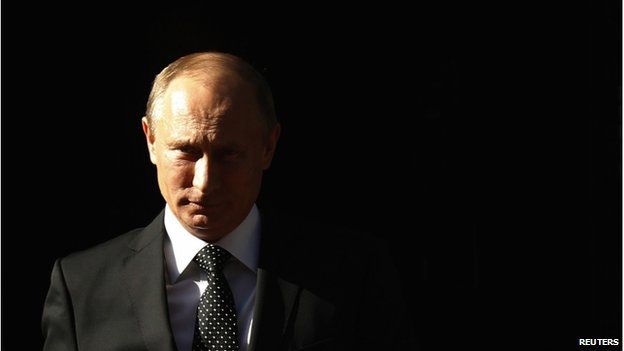Is Putin right?
- Published

Russian President Vladimir Putin says that even if oil plummets to $40 per barrel, his country's economy will manage - and rebound in two years.
The key is what happens to the rouble, a currency that has hit historic lows against the dollar and is very volatile, and whether Russia can afford to repay its debts.
Unlike in 1998, when it was rescued by the IMF, Russia has a floating currency. By not being pegged to the dollar, the currency can take the brunt of the adjustment, instead of costly interventions or painful hits to the economy. Not completely of course, but it is less pressurised than having to defend the currency that's been a part of most emerging market balance-of-payments crises.
Well, Russia sped up a planned float for the currency that was slated for the end of the year. In November, the central bank decided that after spending $30bn to stabilise the currency, it wasn't working as capital left the country in the wake of the Ukraine crisis and the rouble fell to 46 per dollar. Since then, it has sunk beyond 80 per dollar.
The concern then was that foreign exchange reserves had fallen to $421bn, down 16% from half a trillion at the start of the year. It fell below a level that's considered to be critical - having enough to cover 6 months of imports.
Now, FX reserves have dropped even further to $416bn and the Russian government has just committed reserves to shore up systematically-important banks to the tune of 1 trillion roubles. That's among other commitments already made, which could total over $100bn next year.
But, not having to defend an exchange rate like in the prior crisis isn't the only concern. Whether Russia can pay its creditors is key. Recall in 1998 that Russia defaulted on its debts, which made for a messy rescue.
Russia owes about $700bn to external creditors, which comes to some 35% of GDP. In terms of upcoming payments, most analysts say that the country can afford its repayments of around $200bn due in the next couple of years.
That's the period of time that Putin says is needed for the economy to get going again.
A big problem is if money continues to leave the country - capital has flowed out for 17 consecutive quarters - then it weakens the currency further. It makes it more expensive for companies to repay their foreign currency-denominated debts, which analysts estimate exceed what the government owes next year, and that could lead to bankruptcies. That in turn hurts the banks, and there's already reports that ordinary Russians have learned from prior crises and are taking their cash out.
This exerts more pressure on those reserves, as the Russian government will be hard pressed to not support its banks and help the economy. Russia may then not have a couple of years if they run out of money to repay debts.
There's always a lot of "ifs" and "maybes" when it comes down what could trigger a default and rescue. Recall in 1998 that interest rates shot up to 150% from a considerable 30% and that wasn't enough to keep the cash inside Russia's borders. So, confidence has a great deal to do with it.
Putin's annual press conference was intended to instil some of that today. We'll find out soon enough if it has worked.